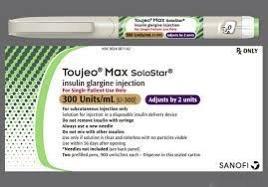Insulin glargine and Alcohol/Food Interactions
There is 1 alcohol/food/lifestyle interaction with insulin glargine.
Insulin Glargine Food
Moderate Food Interaction
Alcohol may affect blood glucose levels in patients with diabetes. Both hypoglycemia (low blood sugar) and hyperglycemia (high blood sugar) may occur, depending on how much and how often you drink. You should avoid using alcohol if your diabetes is not well controlled or if you have high triglycerides, neuropathy (nerve damage), or pancreatitis. Moderate alcohol consumption generally does not affect blood glucose levels if your diabetes is under control. However, it may be best to limit alcohol intake to one drink daily for women and two drinks daily for men (1 drink = 5 oz wine, 12 oz beer, or 1.5 oz distilled spirits) in conjunction with your normal meal plan. Avoid drinking alcohol on an empty stomach or following exercise, as it may increase the risk of hypoglycemia. It is important to tell your doctor about all other medications you use, including vitamins and herbs. Do not stop using any medications without first talking to your doctor.
Switch to professional interaction data
Insulin glargine drug interactions
There are 392 drug interactions with insulin glargine.
Insulin glargine disease interactions
There are 3 disease interactions with insulin glargine which include:
More about insulin glargine
- insulin glargine consumer information
- Check interactions
- Compare alternatives
- Pricing & coupons
- Reviews (292)
- Latest FDA alerts (3)
- Side effects
- Dosage information
- During pregnancy
- Support group
- Drug class: insulin
Related treatment guides
Drug Interaction Classification
| Highly clinically significant. Avoid combinations; the risk of the interaction outweighs the benefit. | |
| Moderately clinically significant. Usually avoid combinations; use it only under special circumstances. | |
| Minimally clinically significant. Minimize risk; assess risk and consider an alternative drug, take steps to circumvent the interaction risk and/or institute a monitoring plan. | |
| No interaction information available. |
Further information
Always consult your healthcare provider to ensure the information displayed on this page applies to your personal circumstances.


